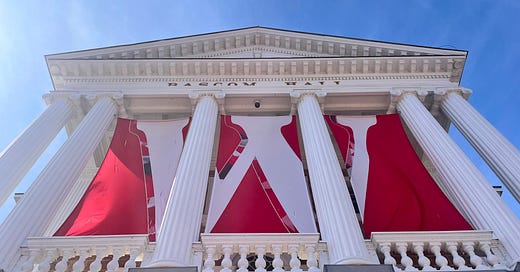UW-Madison, UW Health Make Changes to DEI Efforts
A new DEI "special advisor" has a history of inflammatory social media posts
After former UW-Madison chief diversity officer LaVar Charleston was demoted due to a pattern of “poor decision-making,” the Trump Administration started crackdowns on DEI in universities across the country, and a report released by the state legislature revealed that the Universities of Wisconsin failed to track spending on diversity, equity, and inclusion programs, UW-Madison and UW Health have made changes to DEI on campus.
Charleston had served as the director of the Division of Diversity, Equity and Educational Achievement, so Provost Charles Isbell Jr. was named to temporarily lead the DDEEA until an interim director could be found. As of June 2nd, a replacement for Charleston still had not been hired.
However, UW-Madison created a new position called “special advisor for access and community” to “advise leadership in the development of the university’s overall plans regarding access and community.” Professor and associate dean Percival Matthews was appointed to the role and will “report directly to the chancellor and provost.”
Matthews leads the School of Education’s Center for Community and Well-Being, which was preceded by the Office of Equity, Diversity, and Inclusion. The CCWB occupies the same office space as the OEDI did.
Last year, Matthews co-authored a paper called “Fostering diversity in mathematics cognition” that criticized the American mathematics education system as “arguably inherently violent toward Black children.” He also argued it is “impossible to read” the U.S. Supreme Court decision that overturned affirmative action “as anything other than a suggestion that many trainees of color do not deserve to be in the university space at all.”
Matthews has also been vocally critical of President Donald Trump. In 2018, Matthews made a Facebook post that said Trump “has a history of racist endeavors” and “makes not-even-veiled racist comments.”
In 2020, Matthews made a Facebook post that said, “A legitimate (adv) use of violence can legitimate (vb) use of violence. There are a number of ways to read that sentence” in response to the murder of George Floyd. Another post rhetorically asked, “And people are surprised that Minneapolis is burning?”
Matthews did not respond to questions from The Madison Federalist about whether he supported the violence associated with the 2020 Black Lives Matter riots, still agrees with his comments about Trump, or if he has suggestions on how to increase ideological diversity on the UW-Madison campus.
However, shortly after the email inquiry was sent, Matthews’s posts were no longer publicly available.
Matthews forwarded the email to university spokesman John Lucas, who said, “UW-Madison supports free expression and doesn’t comment on the personal social media accounts of its students, faculty or staff.”
Daniel Lennington, deputy counsel at the Wisconsin Institute for Law and Liberty, criticized the creation of the special advisor position, saying, “UW-Madison’s priorities still include racial diversity and racial equity. They treat employees and students based on their membership in racial groups, rather than based on individual merit and need. This is very troubling and eventually UW-Madison will be forced to pay the price for their blatant race discrimination.”
Lucas responded to a separate email about how UW-Madison is changing its DEI programs with a link to a February statement from Chancellor Jennifer Mnookin that reaffirmed UW’s commitment to diversity and expressed concerns about overreach from the Trump Administration. However, he did not respond to questions about how UW-Madison has changed its DEI programs in recent months or if the university has tried to address the lack of ideological diversity in its faculty.
In addition to the changes at UW-Madison, UW Health rebranded its diversity, equity, and inclusion efforts as “Social Impact and Belonging.” In a video message, Vice President of Diversity, Equity and Inclusion at UW Health Shiva Bidar-Sielaff said the rebranding was to ensure that DEI priorities “endure well into the future.”
In a statement to The Madison Federalist, UW Health media relations manager Sara Benzel wrote about the change:
“When the UW Hospitals and Clinics Authority was established 30 years ago, UW Health was charged in Wisconsin law with a clear charter and mission: “advancing health without compromise through service, scholarship, science and social responsibility.” Social Impact and Belonging are foundational to fulfilling the mission laid out in our charter. At UW Health, social impact refers to the effects health care policies, practices and interventions have on the well-being of individuals and communities, including the work we do every day to improve health outcomes, access to care and overall quality of life. Belonging is the understanding that you are valued and respected for who you are as an individual, whether you are a patient, a team member, or a part of our broader community. We have a responsibility to ensure all UW Health team members feel valued and respected. We have a responsibility to ensure patients have access to remarkable health care that is respectful of each patient’s individual experience. We have a responsibility to improve health outcomes for all our communities through social impact. Social Impact and Belonging best express the work we do, which as always, is about all the staff, patients and communities we serve.”
She did not answer whether these changes were made because of pressure from the Trump Administration or if UW Health discriminates based on race through any of its programs.
Lennington said, “We know UW Health and UW-Madison both frequently use race discrimination in decision making, as they brag about it in their public records and on their websites.”
He warned that “the Trump Administration could remove all federal funding under Title VI of the Civil Rights Act of 1964. They are doing it elsewhere, and UW Health and UW-Madison appear to be fine with this risk.”
Earlier this year, the Wisconsin Institute for Law and Liberty sent a complaint to the U.S. Department of Education over the promotion of “several racially discriminatory scholarship programs,” including one that required recipients to be white.










